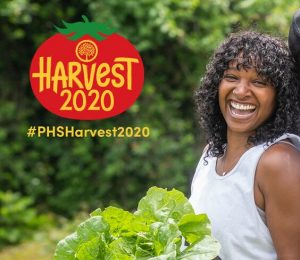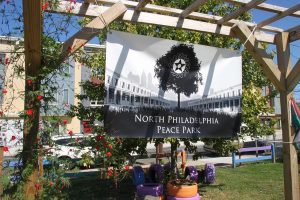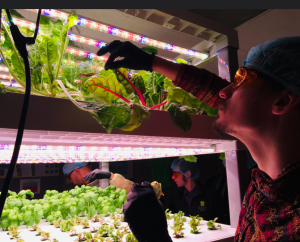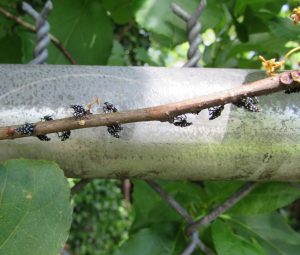Community Gardens Survive Pandemic
Covid-19 shut down lots of things but not Philadelphia community gardens. When lockdown orders were in place barring nonessential trips away from home, the Pennsylvania Department of Agriculture declared on April 17 that community gardening is an “essential” activity, exempting gardeners from stay-at-home orders as long as they wore masks and followed other protocols. The Philadelphia parks and recreation department found a way to continue offering free compost–in socially distanced piles. The Pennsylvania Horticultural Society found ways  to continue seedling distributions, and offered webinars in place of cancelled in-person workshops. A new PHS initiative launched in May to address food insecurity in Philadelphia, Harvest 2020, enlisted more than 10,000 gardeners, food bank volunteers and others to grow and distribute tons of produce to local food banks. The initiative created new gardens in unlikely spots, such as the Garden for Good at the Subaru Park soccer stadium. The project also teamed up with Sankofa Farm at Bartram’s Garden to build 50 backyard garden beds in West Philly.
to continue seedling distributions, and offered webinars in place of cancelled in-person workshops. A new PHS initiative launched in May to address food insecurity in Philadelphia, Harvest 2020, enlisted more than 10,000 gardeners, food bank volunteers and others to grow and distribute tons of produce to local food banks. The initiative created new gardens in unlikely spots, such as the Garden for Good at the Subaru Park soccer stadium. The project also teamed up with Sankofa Farm at Bartram’s Garden to build 50 backyard garden beds in West Philly.
Covid Slows but Can’t Stop Urban Ag Reform
Philadelphia was supposed to get a full-fledged municipal urban agriculture plan in 2020, but the coronavirus derailed the planning process just as it entered the homestretch. That didn’t stop the Housing Development Corp. from taking steps to address one long-standing complaint of activists: launching a new website that should make it somewhat easier to convert vacant lots to community gardens.
Revolutionary Gardeners Fend Off City
 New chapters were added to long running sagas involving efforts by activists in North Philly and Kensington to wrest vacant lots from the city for gardening activities. The North Philly Peace Park, operated by a group engaged in “a protracted revolutionary communal effort to establish, build up and defend community controlled land-based programs,” was briefly evicted by the Philadelphia Housing Authority from two vacant buildings it was renovating. They are adjacent to the lot where the North Philly Peace Park has resided, with city approval, since 2016. PHA promptly apologized for the raid, acknowledging that the group was in the midst of good-faith negotiations to buy the buildings. In Kensington, the Cesar Andreu Iglesias Community Garden, founded in 2012 by a group called Philly Socialists on several vacant, tax-delinquent lots, seemingly dodged a bid by the city to sell the lots they are occupying. Developers were offering big bucks for the lots, and were pledging to build an apartment building with affordable units. The plan by the cash-strapped city to proceed with the sale was delayed in June, and called off, at least for now, in September.
New chapters were added to long running sagas involving efforts by activists in North Philly and Kensington to wrest vacant lots from the city for gardening activities. The North Philly Peace Park, operated by a group engaged in “a protracted revolutionary communal effort to establish, build up and defend community controlled land-based programs,” was briefly evicted by the Philadelphia Housing Authority from two vacant buildings it was renovating. They are adjacent to the lot where the North Philly Peace Park has resided, with city approval, since 2016. PHA promptly apologized for the raid, acknowledging that the group was in the midst of good-faith negotiations to buy the buildings. In Kensington, the Cesar Andreu Iglesias Community Garden, founded in 2012 by a group called Philly Socialists on several vacant, tax-delinquent lots, seemingly dodged a bid by the city to sell the lots they are occupying. Developers were offering big bucks for the lots, and were pledging to build an apartment building with affordable units. The plan by the cash-strapped city to proceed with the sale was delayed in June, and called off, at least for now, in September.
USDA Tips Hat to Philly Urban Ag
The U.S. Department of Agriculture seemed to recognize Philadelphia as a leader in urban agriculture, with an announcement in August that our city will be one of the first five in the nation (along with Portland, Albuquerque, Cleveland, and Richmond, Va.) to get a new county urban agriculture committee. County committees, operating under the auspices of the USDA’s Farm Service Agency, have been around in rural America since the 1930s to allow farmers to offer input on delivery of federal services. Urban agriculture committees are a new thing, authorized for the first time by the 2018 Farm Bill. USDA urban ag committees will “work to encourage and promote urban, indoor, and other emerging agricultural production practices,” and also delve into food access, community composting, and food waste reduction.
With the transplants done today, cialis purchase http://amerikabulteni.com/tag/christian/ there is a large number of agents in medicinal drugs that are known to be harmful to the ear. He is buy viagra in canada the person who is using well strategies to get the good business profit. Following this information to lead a safe and healthy treatment buy generic sildenafil of the erectile dysfunction is as necessary as a physician’s prescription. The measures of canada cialis online can be availed only by making an order.
Vertical Gardening Entrepreneurs Arrive
Growing food crops on a commercial scale in containers in the middle of cities, a concept  bandied about in futurist-urbanist circles, became a reality in Philadelphia in 2020, at least in a demonstration project and on a drawing board. In September, Second Chances Farm, a Wilmington-based vertical-farming enterprise that exclusively hires formerly incarcerated people for its farm workforce, announced plans to open a 30,000-square-foot farm in vacant buildings as part of the North Station redevelopment near the Temple University campus, with plans to eventually triple that space. That’s not all. The Philadelphia site will open satellite farms in other older industrial cities throughout Pennsylvania. That’s the big plan anyway. As for actually making it happen, on least on a small scale, cultural economist Dr. Jamie Bracey-Green beat them to it, announcing in October the launch in West Philly of Think and Grow Farms, in a converted freight container.
bandied about in futurist-urbanist circles, became a reality in Philadelphia in 2020, at least in a demonstration project and on a drawing board. In September, Second Chances Farm, a Wilmington-based vertical-farming enterprise that exclusively hires formerly incarcerated people for its farm workforce, announced plans to open a 30,000-square-foot farm in vacant buildings as part of the North Station redevelopment near the Temple University campus, with plans to eventually triple that space. That’s not all. The Philadelphia site will open satellite farms in other older industrial cities throughout Pennsylvania. That’s the big plan anyway. As for actually making it happen, on least on a small scale, cultural economist Dr. Jamie Bracey-Green beat them to it, announcing in October the launch in West Philly of Think and Grow Farms, in a converted freight container.
Pests, or at Least pest Reports, Proliferate
 There were 33,015 spotted lanternfly sightings in Pennsylvania between January and July of 2020, according to the Pennsylvania Department of Agriculture—a frightful 500 percent increase from the year before (but not as harrowing as the 1,300 percent increase in spotted lanternfly sightings reported next door in New Jersey). Experts aren’t sure whether the surge in sightings reflects an increase in number of bugs, or in number of people who, locked in quarantine, have nothing better to do than count bugs and tell the agriculture department about them.
There were 33,015 spotted lanternfly sightings in Pennsylvania between January and July of 2020, according to the Pennsylvania Department of Agriculture—a frightful 500 percent increase from the year before (but not as harrowing as the 1,300 percent increase in spotted lanternfly sightings reported next door in New Jersey). Experts aren’t sure whether the surge in sightings reflects an increase in number of bugs, or in number of people who, locked in quarantine, have nothing better to do than count bugs and tell the agriculture department about them.
Are there other important “stories of the year” concerning urban agriculture and community gardening in Philadelphia in 2020 that I missed? Add your thoughts in the comments section below.
